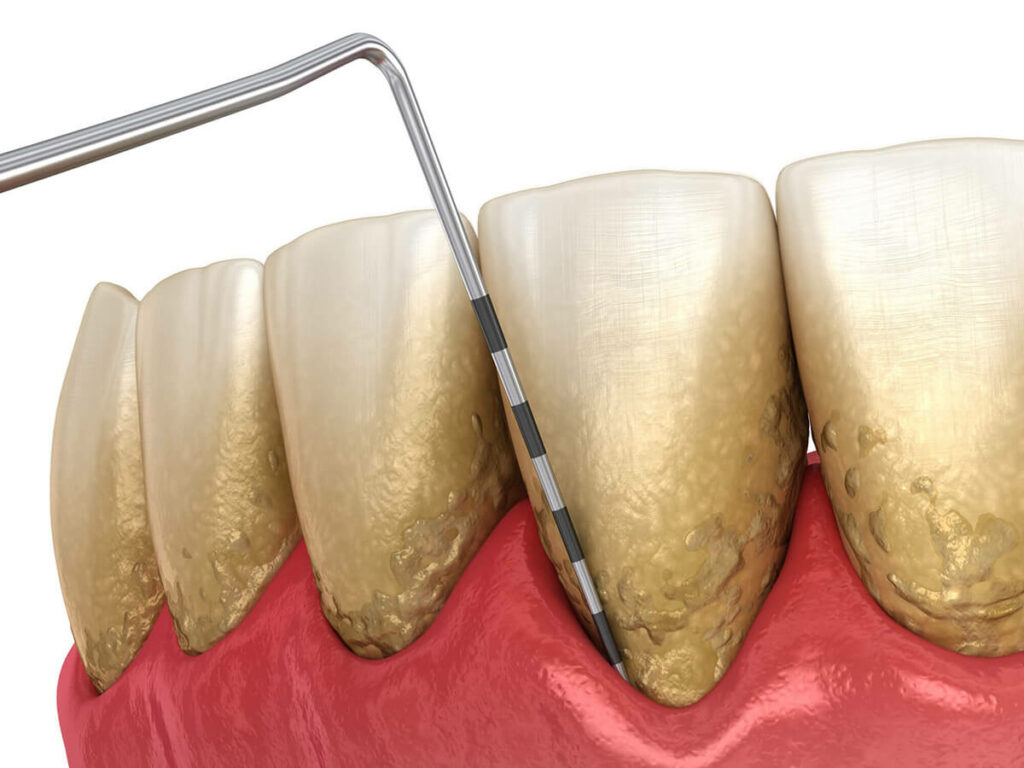Periodontal Disease Treatment (Gum Disease)
Gum disease (periodontal disease) is a significant oral health issue that can impact anyone regardless of background. Our dental clinic offers comprehensive periodontal treatments to restore your gum health at every stage of the disease.
Understanding Periodontal Disease
Periodontal disease, often referred to as periodontitis or gum disease, is a severe infection that impacts the gums and bone supporting your teeth. Healthy gums and bones are essential for maintaining your teeth’s stability. When plaque and food particles get trapped between your gums and teeth, they can cause an infection, leading to gum disease. This condition, which affects many individuals, is primarily caused by the bacteria in plaque build-up on teeth.
Gingivitis, which involves redness, swelling, and bleeding of the gums, represents the initial phase of gum disease. When this mild gum inflammation is not treated, it can progress to periodontitis, a more severe infection capable of permanently damaging the supporting structures of the teeth. The key is to catch gingivitis early and prevent its escalation into advanced gum disease through proper oral hygiene and professional treatment.
Identifying periodontal disease in its early stages is vital for preventing tooth and bone loss. To determine if you have periodontitis and assess its severity, we will perform the following steps:
- Medical History Review: We consider risk factors like genetics, medications, and smoking.
- Teeth and Gum Examination: Checking for plaque/tartar build-up and bleeding gums.
- Gum Pocket Depth Measurement: Using a dental probe to assess gum health.
- 1-3 mm: Healthy gums
- 3-5 mm: Early periodontitis
- 5-7 mm: Moderate periodontitis
- 7-10 mm: Advanced periodontitis
- Dental X-rays: Identifying bone loss associated with deep gum pockets.
This disease is common but preventable. It typically results from poor oral hygiene, such as not flossing and brushing twice daily or getting regular dental exams. Learn more about the causes, symptoms, and treatment options below.

-
How is periodontal disease or gum disease treated?
Gum disease, also known as periodontal disease, has two main treatment options depending on the severity.
The first is scaling and root planing, which is a deep cleaning procedure and the standard treatment for mild to moderate gum disease. It removes plaque, tartar and bacteria from under the gums and smoothes the tooth roots to prevent future buildup. This allows the gums to heal and reattach to the teeth.
The second treatment is bone grafting, which is required when the bacteria reaches the jawbone, causing deterioration. The dentist surgically accesses the damaged bone and applies proteins and bone-like material to help regenerate the lost jawbone. This strengthens the jaw to support dental implants if teeth were lost. In summary, gum disease is treated either by deep cleaning for earlier stages or bone grafts for later stages with severe bone loss, in order to heal the gums and strengthen the jaw.
Post-Periodontal Disease Treatment -
How much does a deep teeth cleaning cost?
We offer high-quality dental care at affordable rates in Winter Springs, FL. Costs vary based on insurance coverage at the time of the procedure:
- Deep Cleaning: $164 – $321 per quadrant
Certain PPO plans may cover 80%
See All Office Fees -
How do I know if I have periodontal disease or gum disease?
The initial indications of gum disease are inflamed and reddened gums, gums that bleed during flossing or brushing, and untreated gingivitis. More advanced signs of gum disease involve tooth loss and exposure of your tooth’s root. Gum disease, if not properly treated, can result in tooth loss.
Signs and Symptoms of Gum Disease
Advanced signs are tooth loss and exposed tooth roots. Symptoms to watch for:
- Bleeding gums
- Sore gums
- Bad breath
- Gums pulling away from teeth
- Loose teeth
- Pain when chewing
- New spaces between teeth
- Swollen gums
- Pus between teeth and gums
- Changes in bite
Based on these symptoms, your dentist can determine the severity of the disease and recommend appropriate treatment to prevent further damage and tooth loss. Vigilant monitoring and treatment of gum disease are key to maintaining good oral health and a bright smile.
-
What causes gum disease?
There are three usual causes of gum disease. The first and most common is chronic periodontitis. This occurs when oral hygiene is neglected and bacteria accumulate beneath the gum line, eventually turning into a hard substance called tartar. Tartar is not easily removed by brushing and flossing and requires professional cleaning. If left untreated the gums become inflamed and damaged and bone loss occurs.
The second cause is aggressive periodontitis, this is believed to have a genetic component as it shows up in a small number of families. It moves quickly and can even be seen in children. The last and the rarest cause is necrotizing periodontal disease. This can occur in people with immune issues and or chronic diseases. The soft tissues and bone are compromised due to a lack of blood flow to the area.
-
What is gum recession?
About half of people over 50 in America have issues with receding gums. However, gum recession can happen to younger people, too. You may just be genetically prone to it. Some individuals are born with thin gums that recede more easily. Environmental factors can also cause gum recession to occur. Aggressive brushing habits, injury, surgery, or ill-fitting dentures are examples of things that can make gums recede.
Treating Receding Gums
If you notice your tooth looks longer than before or experience sensitivity or discomfort when brushing and flossing, you may have receding gums. Be sure to come in and have one of the dentists take a look. If you do have recession, we can typically take a small graft of tissue from the roof of your mouth and place it over the receded area. This procedure helps protect the tooth from further damage. It’s a minor surgery that can be done for a single tooth or multiple teeth depending on your needs.
Questions About Gum Disease?
If you have any questions about gum disease or need a consultation, please use one of the options below. We also offer a variety of restorative, preventative, and cosmetic dental services. Check out the link below to view them all.
